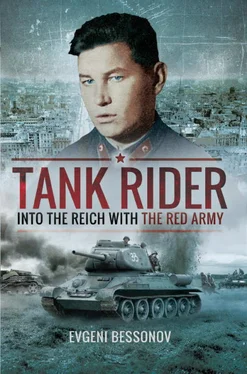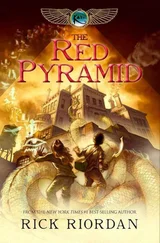Evgeni Bessonov
TANK RIDER
INTO THE REICH WITH THE RED ARMY
Translated by Bair Irincheev


EVGENI BESSONOV
FOREWORD

Many of my comrades told me that I should write my memoirs but it is actually a difficult thing to do. After all, I’m not a professional writer – if the truth be known, I’m very far from that. But I can tell the story of my family, my childhood and my youth, and relate to you my experiences during the years of the Great Patriotic War.
Human memory is an amazing thing and life erodes away many experiences and events. With all the burdens and cares of daily life I had no time to indulge myself in my memories. I was not a government official or a politician, but a simple individual just like millions of others in our country. My memoirs will concern themselves with events that I saw take place or with those events which had an impact on me and those around me during the War. I do not claim to have a full and objective reflection of events – human memory isn’t perfect – but I will try my best. Similarly, I will try not to be too critical in my judgement of others. Things that are described in the memoirs are my personal point of view, my personal judgement and my perception of life. These memoirs are a look back at the life of a typical member of the Red Army, a career officer, who served 35 years of his life in the military – from 1941 to 1976. I entered service when I was 18 and retired at the age of 53 as a Colonel.
Of course, my memoirs will focus almost exclusively on the war years. There are fewer and fewer veterans left and those who are still alive are old. I myself turned 80 in 2003. The Great Patriotic War took a tremendous toll on the peoples of the Soviet Union but, regardless of how hard it was, the common people stood up to the test, despite heavy losses, and despite it being very hard both at the front and behind the lines. My aim is to show the War through the eyes of a participant in those events – not through the eyes of a Marshal or a writer, but of a platoon leader and company commander of tank riders, the motor rifle battalion of a mechanized brigade in the 4th Guards Tank Army. I fought for two years in the 4th Guards, from 1943 to 1945, and I covered around 3,800 kilometres with this unit. Such was my wartime voyage, and it was tough every step of the way. I participated in infantry assaults and rode into battle on tanks attacking the enemy positions. Intuition, experience of battle and knowledge of enemy tactics saved my life many times, but I think that I mostly survived by pure luck. Luck was vital at the front, and I can’t over-emphasize its importance for any soldier.
EVGENI BESSONOV 2003
CHRONOLOGY

1941
22 June — Germany invades the Soviet Union
16 July — The Germans reach Smolensk
9 August — Drafted into Red Army, to Chebarkulski military camp
16 November — Transferred to Kamyshlov military infantry academy
1942
July — Assigned to 365th Reserve Rifle Brigade at Surok station
19 November — The Soviet counteroffensive at Stalingrad begins
1943
31 January — The Germans surrender at Stalingrad
Late May — Transferred to personnel section, Moscow
5 July — The battle of Kursk begins
July — Assigned to Bryansk front
August — Joined 4th Tank Army, assigned to 6th Guards Mechanized Corps, 49th Mechanized Brigade, 1st Motor Rifle Battalion, appointed 2nd platoon leader
September — Fighting in the Orel offensive
October–December — Into reserve at Karachev
6 November — Kiev is recaptured
1944
January — 4th Tank Army transferred to Kiev
February — Transported by train to Polonnoe, marched to Shepetovka, by truck to Slavuta
4 March — Spring offensive is launched in the Ukraine
March–April — Fighting in the Kamenets-Podolsk campaign (brigade awarded title of 49th Mechanized Kamenets-Podolsk Brigade)
May–June — Into reserve at Kopychintsy
July–September — Fighting in the Lvov-Sandomir operation
October–November — Into reserve at Sandomir
December–January — Fighting in the Vistula-Oder operation, through Poland to the German border
1945
February — Fighting to the Neisse bridgehead
March–April — Into reserve at Oberau
April — The march on Berlin, wounded in action
30 April — Hitler commits suicide
2 May — Berlin surrenders to the Red Army
8 May — Keitel signs German surrender at Zhukhov’s Headquarters
9 May — Prague falls to the Red Army
May — Discharged from hospital, rejoined battalion at Prague; end of the Great Patriotic War
MAP

YEARS OF CHILDHOOD AND YOUTH

Iwas born in Moscow on 20 July, 1923, in no. 77 Friedrich Engels street, formerly known as Irininskaya. My father, Ivan Vasilievich Bessonov, moved to Moscow from a village in 1908 at the age of fifteen. Although he had almost no education, he managed to get a job in a small store and after a while become a prikazchik (salesman) and later senior salesman. In 1915 he married my mother, Olga Pavlovna, a native of Moscow. They had a daughter Elena (we called her Lelya) in 1916 and that same year my father was drafted into the army. He served in the army until the February revolution and retired in 1917. After the Great October Revolution my father worked in trade before retiring in 1960. My mother studied at a school for tailors in Moscow but didn’t like to recall that period of her life. As she put it, it was pure drudgery. They had to get up at 5 or 6 o’clock in the morning, start the oven, cook tea for the foremen, wash dishes after their meal and clean the rooms and the workshop. Such apprentices would only start their professional training several years later, as it was profitable for the master to have several minor servants almost free of charge. After she completed her professional training and became a tailor, my mother got a job in a more prestigious tailor’s shop at Kuznetski bridge and had a decent salary for that time – 37–40 roubles in 1913. After she married my father she had four children and became a housewife.
In early 1917 my parents were renting an apartment in the building where I was to be born. It was a typical Moscow yard, surrounded by a high fence. There were many small yards like this in the street, and they were named after the landlords: Krushinski, Reshetkin, Maslov, Petrusinski and so on.
Читать дальше
















